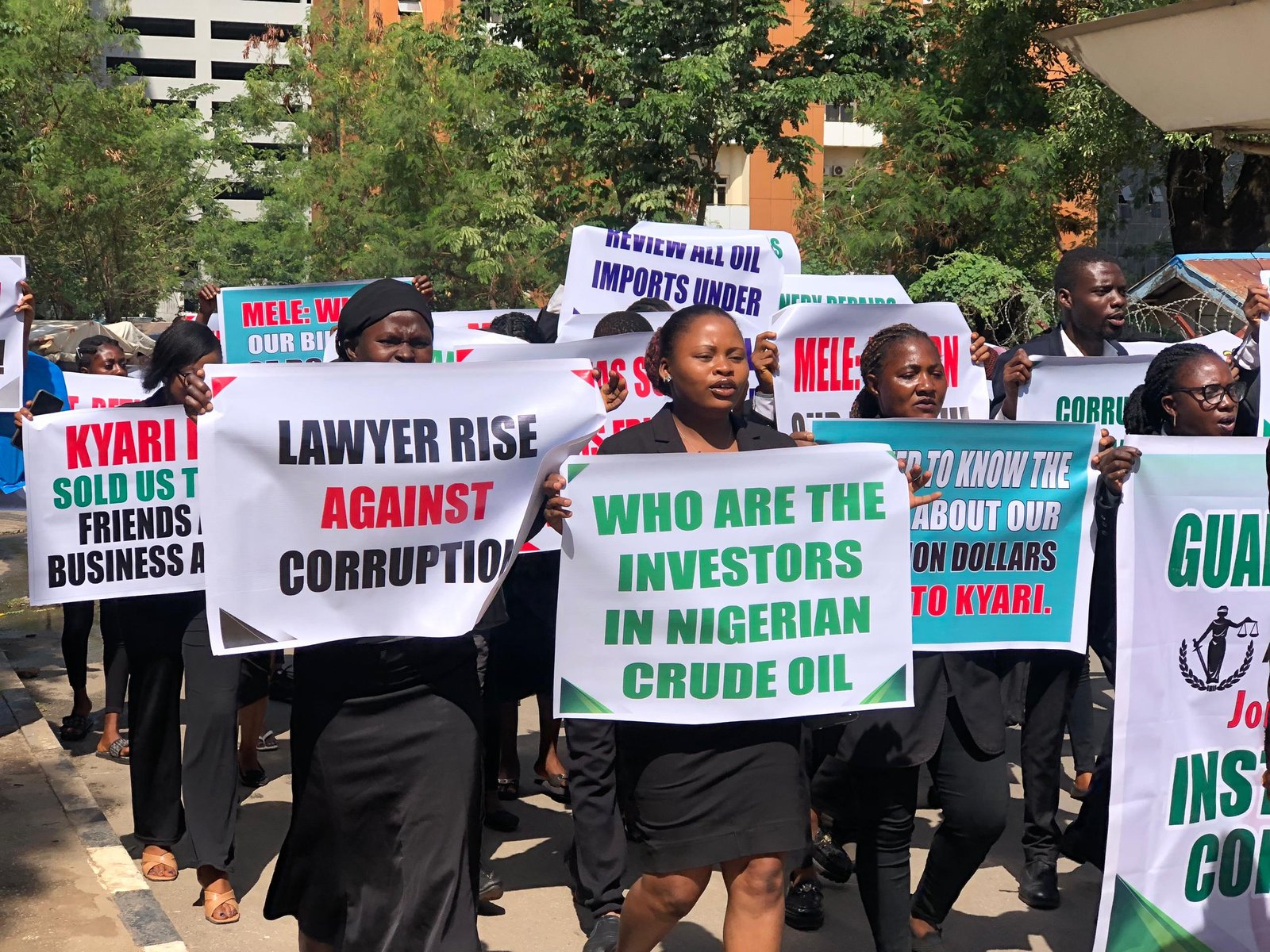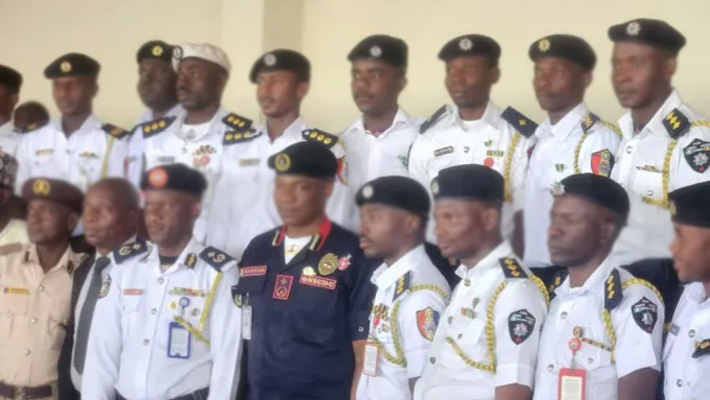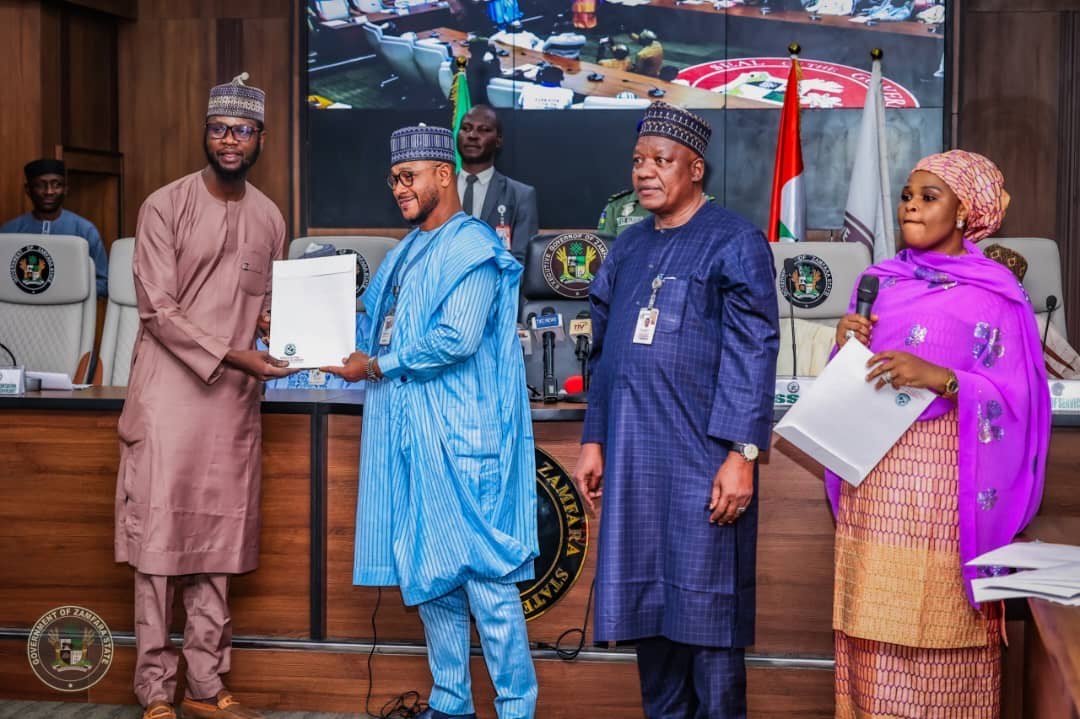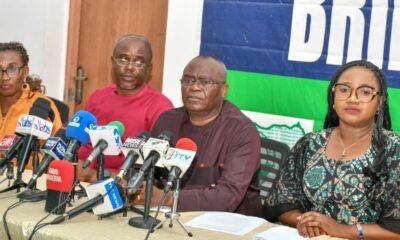News
NNPCL: Lawyers storm AGF’s office as protest for probe of Kyari enters day 2

Over 500 anti-corruption lawyers on Wednesday stormed the office of the Attorney General of the Federation (AGF) at the Ministry of Justice in Abuja, demanding the immediate probe of Mele Kyari, the erstwhile Group Chief Executive Officer of the Nigerian National Petroleum Company Limited (NNPCL).
In a remarkable show of patriotism, the lawyers, under the aegis of the Guardians of Democracy and Rule of Law said they are out to rid the nation of corruption especially in the oil industry where Kyari and his allies sold the nation for a piece of porridge.
According to a petition co-signed Barrister Emmanuel Agada and Jonathan Uchendu, the lawyers lamented that Kyari’s leadership of the NNPCL was plagued with countless allegations of corruption, which were allegedly made inevitable by the opaque way he ran the organization.
The lawyers cited the controversy surrounding the rehabilitation and restreaming of government-owned refineries, where billions of dollars were spent, but the figures and facts do not add up.
The petition highlighted the case of Matrix Energy Limited, which allegedly invested $400 million in the rehabilitation of the Port Harcourt Refinery, even as the Federal Executive Council had approved $1.5 billion for the repairs of the same facility.
The NNPCL is now reportedly owing Matrix Energy more than $2 billion, with the debt being serviced through daily crude oil allocations to Matrix Energy that are not being paid for.
The lawyers demanded that the AGF review all agreements entered into by the NNPCL under Kyari’s administration, launch a fact-finding investigation into the questionable transactions, and institute a commission of inquiry into the NNPCL’s handling of the refineries’ repairs under Kyari.
The protesting lawyers vowed to continue their agitation until Kyari is brought to justice and the truth about the alleged corruption is uncovered.
The petition added: “The Guardians of Democracy and Rule of Law strongly believe that getting to the root of this matter will help the Federal Government to account for how public resources were squandered on the controversial refineries’ repairs undertaken under the Kyari leadership.
“In view of the facts stated above, we request that the Minister of Justice and Attorney General of the Federation to immediately review all agreements entered by the NNPCL under the Mele Kyari administration.
“An investigation into the questionable transactions would also point the government in the direction of what funds to recover and from whom, which is sorely needed now considering Nigeria’s economic condition.
“Furthermore, investigating all that transpired will set the stage for holding even the current leadership accountable while equally identifying potential pitfalls for those who are now in charge so that Nigeria is not caught in a loop of repeating the same mistakes.
“A fact-finding investigation be launched to ascertain how much the Federal Government has lost to such agreements and recommendations on concrete steps to recover identified funds. We demand for an immediate judicial review of all matters related thereto.
“The Guardians of Democracy And Rule of Law will appreciate it if the Minister of Justice and Attorney General of the Federation can escalate the issue to a point where the Federal Government institutes a commission of inquiry into NNPCL’s handling of the refineries’ repairs under Kyari and the sacked board. “
A deputy Director at the office of the AGF, Winifred Adekunle who received the petition promised to deliver it to the Justice minister and assured them that prompt action will be taken.
News
Federal fire service decorates 130 officers in Kano

The Kano State Command of the Federal Fire Service (FFS) has decorated 130 officers recently promoted to various ranks in a ceremony held in Kano.
The Command’s Controller in the state, Kazeem Sholadoye disclosed this in a statement issued by the service’s Public Relations Officer, Al-Hassan Kantin on Wednesday in Kano.
Congratulating the officers, the state controller described their promotion as well deserved and a call to greater responsibility and professionalism.
Sholadoye charged the officers to see their new ranks as an opportunity to demonstrate increased commitment to protection of lives and property.
He reminded them that promotion comes with higher expectations in service delivery.
Speaking on behalf of the promoted officers, Deputy Superintendent of Fire in the command, DSF Abdullahi Muhammad expressed appreciation to the management for organising what he described as a befitting ceremony.
He reiterated the readiness of the officers to rededicate themselves to duty and uphold core values of the Federal Fire Service.
News
Tinubu salutes Bisi Akande’s national legacy at 87

President Bola Tinubu has paid glowing tributes to Chief Bisi Akande, elder statesman and former APC national chairman, as he marked his 87th birthday.
Tinubu said this in a special tribute on Thursday to celebrate Akande’s life of service and democratic commitment.
He described Akande as a towering figure who contributed significantly to Nigeria’s political development and democratic institutionalisation.
The President said Akande’s political journey was shaped by Chief Obafemi Awolowo’s progressive ideology and commitment to public service.
Akande began his career as an accountant with British Petroleum before leaving the private sector for public service.
He served as Secretary to the State Government in old Oyo State in 1979 and later became Deputy Governor during the Second Republic.
Tinubu noted that Akande later served as Governor of Osun from 1999 to 2003, where he further distinguished himself.
As interim chairman of the APC, Akande laid the foundation for the party’s historic victory in 2015, Tinubu said.
The President praised Akande’s leadership, integrity, industry and sacrifices for the party and the nation.
He described Akande as a mentor whose guidance, advice and encouragement shaped his political journey.
Tinubu said Akande’s continued support for his administration and the Renewed Hope Agenda remains invaluable.
He noted that, even at 87, Akande remained a firm advocate of democracy, social justice and good governance.
The President prayed for Akande’s good health and renewed strength as he marked the milestone birthday.
News
Lawal presents certificates to 50 Crescent varsity graduates 9 years after graduation

Gov Dauda Lawal, on Thursday presented certificates to 50 former students of the Crescent University, Abeokuta, Ogun, nine years after their graduation.
This is contained in a statement by the governor’s spokesperson, Sulaiman Idris in Gusau, Zamfara.
The presentation took place at the Grand Chamber of the Government House, Gusau.
According to Idris, the former students, who were on the state government’s scholarship, graduated nine years ago, but could not receive their certificates due to the state government’s failure to settle their outstanding tuition fees owed the institution.
“The former students were left hanging for nine years because their tuition fees were not settled.
“The Crescent University declined to release the students’ results due to the non payment of their outstanding tuition fees.
“The state government, under Gov. Dauda Lawal, after carefully studying the case, reached out to the university and settled the outstanding tuition fees.
“Among the 50 students, is a First Class graduate in Chemistry and several Second Class Upper degree holders,” he said.
While presenting the certificates to the graduates, Lawal restated his commitment to revamping the educational sector.
Lawal also reaffirmed his administration’s commitment to continue to prioritise education to enhance the even development of the state.
-

 Cover5 months ago
Cover5 months agoNRC to reposition train services nationwide.. Kayode Opeifa
-

 Fashion9 years ago
Fashion9 years agoThese ’90s fashion trends are making a comeback in 2017
-

 Entertainment9 years ago
Entertainment9 years agoThe final 6 ‘Game of Thrones’ episodes might feel like a full season
-

 Opinion1 year ago
Opinion1 year agoBureaucratic Soldier, Kana Ibrahim heads Ministry of Aviation and Aerospace After Transformative Tenure at Defence
-

 Opinion1 year ago
Opinion1 year agoHon. Daniel Amos Shatters Records, Surpasses Predecessor’s Achievements in Just Two Years
-

 Opinion2 months ago
Opinion2 months agoBarrister Somayina Chigbue, Esq: A rising legal leader shaping institutioal excellence in Nigeria
-

 News6 months ago
News6 months agoNigerian Nafisa defeats 69 Countries at UK Global Final English Competition
-

 Special Report1 year ago
Special Report1 year agoGolden Jubilee: Celebrating Tein Jack-Rich’s Life of Purpose and Impact




